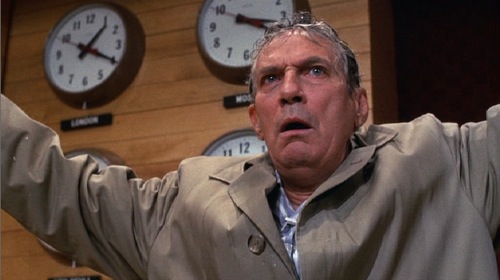The other night my wife and I settled down to watch a classic, one which I hadn’t seen since, frankly, I was too young to really understand what it was about: Network. It’s surreal how topical this thirty-two year-old film is. Network tells the story of the later days of a fictional news anchor’s career. Howard Beale (played by Peter Finch) is a respectable old journalist whose ratings have slipped as he has personally slid into alcoholism. Beale’s story is a trapping for a larger allegory about the encroachment of entertainment programming into the news cycle, though. Most of the real action takes place between Diana Christensen (played by Faye Dunaway) and Frank Hackett (Robert Duvall), two ambitious executives seeking to turn Beale’s network around into a profit-center. When Beale announces on live television that he’s going to commit suicide during his final broadcast, the tensions between corporate greed, personal ambition, pride, and tradition all come to a head.
Journalism is expensive, and airtime during a news broadcast is a hard sell. Historically we’ve seen the real-world broadcast networks put on their news programming as what amounts to a pro-bono basis. The costs of maintaining a pool of reporters in areas of interest around the world are high, so corners have to be cut to stay on budget, to keep the ship afloat. In Network, Hackett it looking to subsume the news division into programming, under the same people that handle soap operas, sitcoms, and made-for-TV movies. Christensen sees great entertainment potential in current events, inspired by footage of a terrorist group’s bank robbery. She looks to start up a weekly drama series based on authentic footage of terrorist acts acquired through contacts with the terrorists themselves. When Beale has a breakdown, she sees a great opportunity and jumps for it.
As somebody that habitually leaves CNN or MSNBC on in the background at home, Network strikes me as prophetic. The news cycle is dominated by a perpetual drive for scandal, for a train wreck, for a horse race. Barack Obama started pulling ahead in the polls, the news media promptly starts digging up anything they can to make the Democratic race look competitive again. Wow. The president is trying to gin up a flimsy case for going to war with some third-world country? Sounds like a great chance to draw some eyeballs to the boob-tube; the news media brews up exciting graphics and dramatic music instead of looking into the facts behind the government’s claims. John McCain looked like he was the obvious candidate in 2000 during the Republican primaries, so the news media starts propping up some incompetent southern governor as some kind of contender. The same buffoon somehow beats McCain (with the complicity of newscasters that were looking for a horse race to cover), and the process began over again trying to knock the clearly-more-capable incumbent vice president to make things look competitive. Nobody sticks around to watch a blowout, and the news directors know this. They’ll stick around for months to hear about some blonde that’s missing in the Caribbean, though.
The dialogue was excellent, the casting just about perfect. The production values were what you’d expect from a 1970’s drama, so the camera work and sound levels will probably grate on the delicate sensibilities of folks raised on THX. This certainly isn’t the kind of movie you can just wander in and out of the room for, it’s a serious movie made for people that have an attention span. Highly recommended.

I have seen this film twice maybe three times. and just the other day, recorded it on my dvr for storage on my TB drive for easy access. But you are correct I would say, it is a story line that continue to follow man’s history in his social/political/economical being….. it is just who needs and/or is pulling the strings/chains.